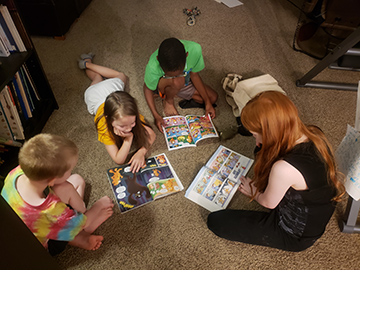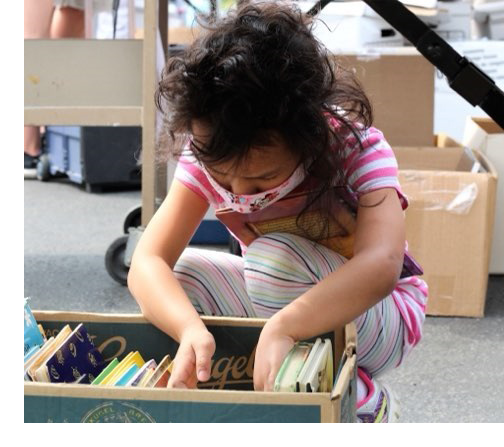Krystal Glick’s four kids love their Lunch at The Library.
“Even a ham sandwich from The Library is much better than a ham sandwich at home, for some reason,” Glick jokes. “I don’t know how that works, but they eat more of it when it comes from somewhere else than just making it yourself.”

Glick, of Harrisburg, is among the many Dauphin County residents who discovered that pandemic or no pandemic, The Library continued filling minds with knowledge and bellies with food. The Library continued to meet the community’s needs, whether that meant sharing books, keeping internet access alive with free wi-fi connections, or continuing the ever-popular summer lunch program – even when The Library’s doors were closed.
A healthy break
Since 2018, Lunch at The Library has served about 3,800 lunches every summer. With funding from the Pennsylvania Department of Education and meals provided by the Central Penn Food Bank and Dauphin County Technical School, the program offers nutritious meals for children ages 18 and younger.
Even COVID-19 didn’t halt the lunches in the summers of 2020 and 2021. This year, lunches were delivered curbside at five of the system’s eight libraries – in most cases, Monday through Thursday. On Fridays and weekends, snacks are available at all locations.
Glick’s family sometimes picnics with their lunches, or the kids eat in the car while Glick picks up groceries. She appreciates the curbside service at the East Shore Library, so the kids don’t have to get out of the car. Since the kids are home-schooled, they don’t get the school-lunch experience, so they’re always eager to see what prepackaged treat is in store – maybe a fruit rollup, chips, or gummies.
Glick appreciates the healthy options, the chance for her kids to explore new foods, and the ease of feeding the kids while she’s running errands.
“It’s really convenient for me in the summer, as it seems to be just as busy as the school year,” she says.
Lifesaving information
In non-pandemic times, The Library’s information services staff fielded emailed questions about everything from genealogy to the number of dots in a ceiling tile (depending on the tile type).
During the pandemic, they noticed a new emphasis: People wanted to know how to stay healthy.
In response, information services created and promoted a page on The Library website’s Health and Human Services section devoted to mental health.
“If it had not been for the research department, a lot of people would not have been able to find the answers they were looking for,” says Information Services Manager Randi Hartman. “When you don’t have access to an actual building, it makes things difficult.”
In light of the pandemic, the staff also updated the printed information available at Library information desks to include the same information, including crisis-intervention resources.
“We’re here for all of our members with the information they need for the pandemic and what is going on as things change,” says Hartman. “The community knows that The Library is going to give them the most accurate information they can find.”
Books in hand
Glick’s kids, ages 5, 7, 8, and 9, are all Library veterans who got much more than convenient lunches at The Library.
Library books help fill the home-schooling curriculum booklist. Before the pandemic, the children enjoyed Library programs (they still call East Shore Area Library “the bug show library” since attending a program on creepy crawlers.) The younger children will take their afternoon reading breaks with audiobooks borrowed from The Library. Glick herself will find time for reading with audiobooks while she’s doing dishes or folding laundry.
Glick’s eldest is a voracious reader who will consume 20 books a week. Getting those books at The Library is a help because, as her mother explains, “I can’t buy enough books to keep her in stories.”
Jo Sheppard, president of The Friends of Kline Library, found herself in tears when the doors closed.
 “There are a lot of things I can do without, but not The Library,” she says. During quarantine shutdowns, the entire system extended free wi-fi outside the walls of every branch, and the Kline Library Friends would see people using it in the parking lot. One man said he was there for a Zoom call.
“There are a lot of things I can do without, but not The Library,” she says. During quarantine shutdowns, the entire system extended free wi-fi outside the walls of every branch, and the Kline Library Friends would see people using it in the parking lot. One man said he was there for a Zoom call.
The Friends decided to keep Library services as active as possible, working with Library staff to create themed, outdoor pop-up book sales from their existing stash of books. A Juneteenth event offered reads on African American history. In December, any pristine books suitable for gift-giving went on sale.
No matter the theme, organizers decided that children would get a free book every time. During an October book giveaway, 300 children arrived in costume and left with books to keep. As always, the events raise awareness of Library services, even during a pandemic.
“We’re here to serve the community a little bit more than we are to raise money,” says Sheppard of Susquehanna Township “We’re more interested in getting people to The Library and helping people get library cards.”
Nan Cavenaugh volunteers with Sheppard as secretary of The Friends of Kline Library board.
“I am and will always remain a book person,” she says, and by that, she means the physical books that people hold in their hands. Health issues in the home kept her inside the house during the pandemic. The Library’s curbside pickup might not have saved her sanity, she says, but it came close.
“Fortunately, I could keep reading, so it did not feel as though the walls were getting closer and closer together those weeks and months when we hardly went outside the house at all,” Cavenaugh says.
“Other people say they binge-watched things on TV, but if you want something that will challenge you, if you want something that can expand your mind and your vision if you want something that can take you places where you’ll never be able to go, libraries are the ticket,’’ she says. “Where else can you go where you can get so much still for free?”




